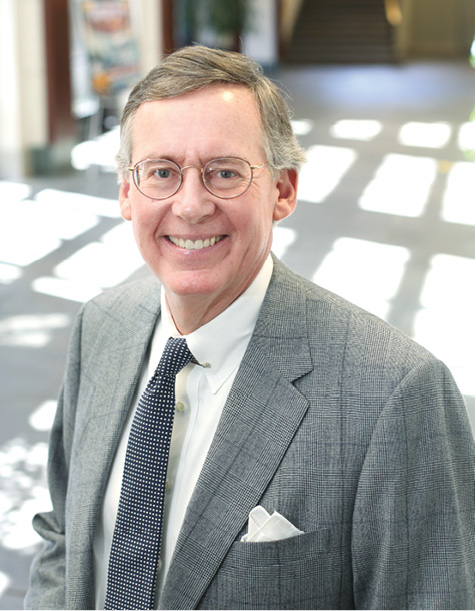By Kara Furlong
In his long tenure as Metro Nashville and Davidson County’s district attorney general, Victor “Torry” Johnson III ’74 learned a fundamental truth about the office: No member of the public ever wants to be involved in a criminal prosecution.
“Whether you’re a victim or a defendant, nobody wants to be there,” said Johnson, who initially interned at the office following his first year of law school. “But I always found it gratifying to help victims and witnesses navigate the system and come out with some sort of justice at the end.”

After earning his law degree, Johnson clerked for Judge William E. Miller on the U.S. Court of Appeals for the Sixth Circuit and then joined the Nashville District Attorney’s office, headed by Thomas H. Shriver ’57 (BA’55). With the exception of a three-year hiatus in private practice, Johnson spent his entire career in the DA’s office. He was appointed to the top position in 1987 by Tennessee Governor Ned Ray McWherter and re-elected to three additional eight-year terms. He retired in August 2014 after serving as Nashville’s chief prosecutor for 27 years.
For his service to the community and generous support of Vanderbilt Law School, Johnson was honored with the Distinguished Service Award at the law school’s spring 2015 Founders Dinner.
As DA, Johnson built a reputation for running an ethical office, bolstering essential services for victims, and applying the law with an even hand. “Part of serving in the role is making sure the system plays by the rules and that defendants are treated fairly,” he said. “It doesn’t—and can’t—matter who someone is or if they have money or power or influence. It’s important that people from all walks of life feel like they get the best representation possible.”
Johnson describes the DA’s office as evolving over the years to meet community needs. Building on a program started by Shriver, he developed a robust staff of social workers dedicated to assisting crime victims, witnesses and prosecutors in support of cases. “Up to that point, victims were really lost in the system and kind of ignored,” Johnson said. “When I left office, we had 17 full-time victim-witness coordinators, and that’s made a huge difference in the way victims are treated and perceive the system.”
Johnson also organized special groups of prosecutors who were given smaller caseloads so they could develop expertise in the most serious crimes. His office pioneered the use of public nuisance laws to shut down illegal gambling operations and shutter motels that were havens for drug dealing and prostitution. He credits a good working relationship with Nashville’s Police Department for cleaning up downtown.
Johnson’s personal philanthropy focused on providing resources for child victims of sexual abuse and domestic violence; he was instrumental in establishing the nonprofit Nashville Children’s Alliance. At the law school, he has served on the Board of Advisors and as an adjunct faculty member and endowed the Victor S. Johnson III Public Interest Stipend Fund and the annual Victor S. Johnson Lecture in Criminal Justice.
He also mentored generations of young lawyers, among them Rob McGuire ’01, who served as an assistant district attorney under Johnson for 13 years. “Torry was a great mentor and boss. He let us do the work we felt we needed to do, and he would never second-guess our judgment,” McGuire said. “If we had a case we thought was worth pursuing or a defendant we thought shouldn’t have been charged, he supported us. To never feel pressure to bow to politics or conviction rates is pretty uncommon in a prosecutor’s office. To have your edict be ‘Do the right thing in every case’ was a gift. And that was Torry’s mantra.”
In January, Johnson became a visiting professor at Belmont University’s College of Law, where he teaches criminal law and a sentencing course. He is enjoying the challenges of the classroom. “The system is only as good as the people in it,” he said. “In the last 15 years, I’ve seen a steady increase of capable young people coming out of law school who want to do public service, who go into it with their eyes open knowing what the sacrifices are but wanting to do it because they want to make a contribution to their community. I think that’s a real plus.”